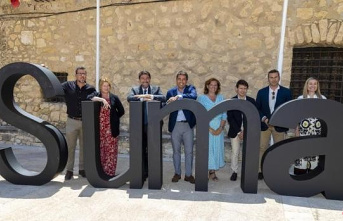They have nostalgia in common. Flamenco and fado look at the sea and begin to cry, thus keeping it alive, between tears and waves that cause more harshness in those who stay than in those who leave. Both, too, mythologize a past and with it, based on wings, have cleaned up their present. The legacy of Amalia Rodrigues seems as lofty as that of Camarón de la Isla, but Ricardo Ribeiro, from Lisbon, and Duquende, a gypsy from Sabadell, have drawn their own speeches from them. They have been shown together in the town of Beja, in Portugal, within the framework of the first edition of 'Terra Mágica', an event directed by the manager Francisco Carvajal with the intention of drawing ties around the figure of Al Mutamid, « first alentejo”.
Carvajal, a well-known guy in the music industry, walks around the hotel with the aura of a mad genius: «We're going to mess it up! We're going to mess it up! », He recalls from time to time.
Moments before the premiere of the show, 'Tanto monta, monta tanto', as it is called, the stalls remain empty. He dresses in a waiting room silence. Duquende, or the shadow that remains under her hat, shyly compliments the person next to her: "A phenomenon," she concludes. A special encounter has taken place between them. Ribeira, who has the almost complete discographies of La Niña de Peines, Antonio Mairena and Manolo Caracol, since he always admired cabal art, explains the cultural similarities:
«Like you, in fado we also have different styles. Also, we talk about complaining. We don't have 'ole', but we do have 'bei!'. And instead of saying that an artist has a duende, we speak of fado. Having fado is just that: a particular grace. For each poem you have a different melody: you can sing tenths in guajiras, the same lyrics in various styles... It's the same. Flamenco is based on the modal system, not on the tonal one like us, and it has a rhythm that Portugal lacks. It has to do with the historical 'facts', which produced disparate developments. For example, Arabic has more influence on flamenco. You also have the dance, but despite all that there is a kind of common ground. of prism. Have you heard a fadista complain? Well that. The Iberian culture exists and differentiates us».
One is an icon of Portuguese music when he plays at home and a first-class ambassador when he acts as a visitor. The other, who sings more than talks, is liked outside the Spanish borders, because for twenty years he toured the world with Paco de Lucía and his cante, so canastero, became highly popular. Perhaps for this reason, when the flamencologist who has searched for the common repertoire of this proposal, Fautino Nuñez, asked Ribeiro, he was clear: «Duquende. I want to work with Duquende. The first thing that comes to you from him is the music itself, the depth, then you see that there is a voice. That's a singer».
A seed yet to be outlined has been born, which has the musicians Javier Patino, José Manuel Neto, Carlos Proença, Didi Pinto, Roberto Jaén and Jorge Bautista in the cast. It will be programmed in other spaces and, who knows, maybe it will end up on disc. Coexistence has only just begun. It will have to continue watering to reap the fruits.
They talk together about purists, still behind closed doors. That is another aspect shared between flamenco and fado: «When one goes beyond the most traditional, it rains cakes, but it is good that it is so. Generate discussion. The discussion makes the light. It makes things move. It also allows us to know the limits. Coming to this concert because you think one is going to crush the other and suddenly you like the one you didn't know better must be wonderful. I'm sure it will happen to someone."
Chatting about the acidity of criticism, in the background, the hollows of the theater are filled with a rumor. Sounds, in the distance, the light footsteps of voices. A local formation of Alentejo cantes, in chorus, in unison and dressed in black shoe polish, comes to welcome them. They start from one of the town squares to follow an itinerary with a canopy swaying. Upon reaching their destination, already at the door, they give the artists a sort of bow. It is the rite of music understood as a meeting place.
Within the theater catharsis occurs. "Blessed be the earth!" cries for joys who has the texture of rock and flower in the larynx. It seems that even the air could break him, but he never bends. Duquende, live, sounds like a record. Ricardo Ribeiro, a well in the middle of the field and time. Out of the blue, actually. Letters are launched, entering each other's territory without stepping on each other, taking advantage of the cracks of the shared tones. A fado through bulerías. Duquende translating Portuguese couplets. The shrimp cante of that fandango that the one from San Fernando took from Morente, the tangos from Extremadura, the bulerías… The work develops in a corseted manner at some point: we have to give it rein after the premiere, which is an achievement in itself.
There are falsetas that transform. Deep strums that are suddenly something else on the Portuguese guitar and the viola. Thus, what is born farruca drags itself beyond the river and takes on a border body. It melts into harmony. A round of dark country tonás, a barrage of echoes forged in a communion of enormous strangeness, seems the clearest example. The public cheers them on; more with 'beis' than with 'oles'. This canastero fado, flavor of the same sun, seems to uncover lights and sores.
Beja is a municipality of beautiful chips that testify to laziness. The summer face of those who come contrasts with the autumn exuded by some of those who remain. It is pure land, of Alentejo cantes, vines and guitars that duplicate their commands approaching the tremolo. It's 'terra' magic, too, as this festival announces that everything has to be understood as a bridge: countries, eras, maps. Life passes through the alleys like the shrunken wind, to the rhythm of old towns, with that natural pause that is born simply because it does not know the rush. The light spiders car models that are rare in Spain. In my opinion, the reality of the elderly here is that of a traditional painting. Sitting, in a circle, they are painting. From Zuloaga, let's say. And they dot the cobblestones with beautiful snapshots.
It is heard, already in the head of each one, what was experienced in front of the stage at the end of the performance. We Spaniards, who have no idea about this neighboring country and ignore even the effort of learning the other language, walk with our hearts on tiptoe, all of us full of certainties that are difficult to shape, since they have to do with matters of the chest. The countrymen murmur. Kind many of them. Fulfilling, others, some of the topics. Beja is remote and hard as the wicker of a basket. Rich, full of roots that do not stain and that have given rise to something that had never been done before: uniting flamenco and fado with knowledge of the cause. Mint and cinnamon battle as in a poem by Lole and Manuel. They want to merge.












